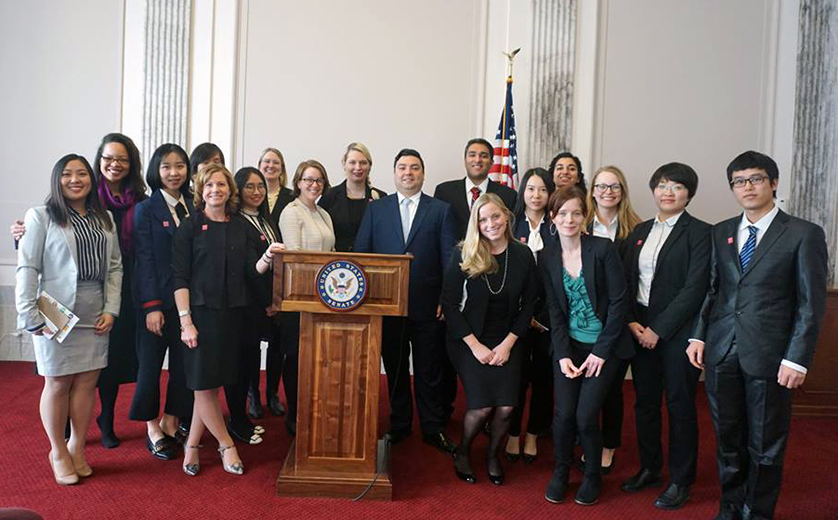With Capitol Hill as their classroom, 23 Brown School students spent Spring Break immersed in policy education and training in Washington, D.C. Throughout the week, they learned from variety of policy practitioners and government officials working on issues connected to the Brown’s School’s core mission of advancing social change through education, research excellence and policy.
The course, “Policy Making, Advocacy and Analysis in the U.S. Legislative System,” was led by Mary M. McKay, Neidorff Family and Centene Corporation Dean of the Brown School, and Sarah Moreland-Russell, senior scholar. Participants included students from all three disciplines at the Brown School — social work, public health and social policy.
Students benefitted from presentations by experts from the Children’s Defense Fund, Coalition for Juvenile Justice, Brookings Institution, U.S. Department of Education, Boys Town, and Pew Charitable Trusts. They had the opportunity to meet with Senators Claire McCaskill (D-MO) and Roy Blunt (R-MO), as well as many other staffers from House and Senate offices.
In her conversation with students, Senator McCaskill highlighted the importance of preparing future leaders in policy, adding that students of social work, social policy and public health bring key strengths to elected office — experience in public service, as well as advanced listening and collaboration skills.
Students also took advantage of a lecture on the timely topic of healthcare policy. Rebecca Farley, Vice President of Policy & Advocacy at the National Council for Behavioral Health, and Dean McKay led students through core tenets of the Affordable Care Act and the newly introduced American Health Care Act. Examination of current legislation allowed students the opportunity to consider whose needs were prioritized and how political agendas were influential in healthcare reform options.
Equipped with policy briefs that they authored, students were well-prepared for their culminating task: advocacy meetings with legislators. Students met with several senators, representatives and legislative staffers in small groups to present evidence on policy topics such as health, juvenile justice and immigration.
Several briefs will be highlighted by the Brown School’s Clark-Fox Policy Institute, which supported the course as part of its commitment to prepare students, scholars and community members for distinguished service and leadership in policy practice.
“Our students were excellent representatives of our school and their respective professions,” said Dean McKay. “This course very much affirms the value of investing in opportunities for students to engage with practitioners at the forefront of evidence-informed legislation.”
The Brown School continues to advance support for policy education. In addition to the policy specialization within the Master of Social Work program and the health policy analysis specialization in the Master of Public Health Program, the Brown School continues to grow the new Master of Social Policy program, which is offered as a dual-degree option for students from several outstanding universities in China. The first cohort of six MSP students have completed the program, and an additional ten students are expected to graduate in August.
